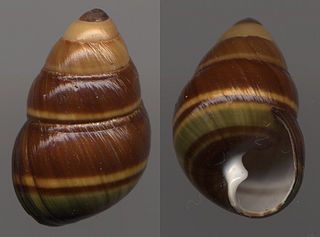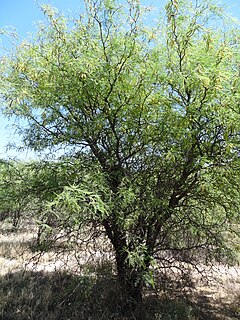
Prosopis is a genus of flowering plants in the family Fabaceae. It contains around 45 species of spiny trees and shrubs found in subtropical and tropical regions of the Americas, Africa, Western Asia, and South Asia. They often thrive in arid soil and are resistant to drought, on occasion developing extremely deep root systems. Their wood is usually hard, dense and durable. Their fruits are pods and may contain large amounts of sugar. The generic name means "burdock" in late Latin and originated in the Greek language.

Prosopis alba is a South American tree species that grows in central Argentina, the Gran Chaco ecoregion, and part of the Argentine Mesopotamia, as well as Bolivia, Paraguay, and Peru. It is known as algarrobo blanco in Spanish. Spanish settlers gave it that name because of its similarity to the European carob tree. Other common names come from Guaraní, including ibopé and igopé.

Prosopis nigra is a South American leguminous tree species that inhabits the Gran Chaco ecoregion, in Argentina and Paraguay. It is known as algarrobo negro in Spanish, which means "black carob tree". It is also variously called algarrobo dulce, algarrobo morado and algarrobo amarillo.

Prosopis affinis is a species of flowering tree in the family Fabaceae, that is native to Argentina, Brazil, Paraguay, and Uruguay. Common names include algarrobillo, espinillo, ibopé-morotí, and ñandubay. It is threatened by habitat loss.

Prosopis caldenia, commonly known as the caldén, is a species of flowering tree in the family Fabaceae, The tree is endemic to subtropical regions of Argentina. It thrives in sandy and arid soil and resists drought, developing an extremely deep root system. The leaves of this tree are pinnately compound, deciduous, alternate and small. Its foliage is tortuous, with conical spines arranged in pairs at the nodes.

Prosopis kuntzei is a South American leguminous tree species that inhabits the westernmost Gran Chaco forests covering areas of Argentina, Bolivia, and Paraguay, where it acts as natural component. It has also been able to colonize the nearby pasture sabanas. It is commonly referred to as itín, palo mataco, carandá or barba de tigre. It is adapted to arid climate, but can also survive flooded ground for a long time.

Prosopis laevigata, commonly known as smooth mesquite, is a species of flowering tree in the pea family, Fabaceae, that is native to Mexico, Bolivia, Peru, and north-western Argentina. In Mexico, the species is found in the nation's the central highlands, the lowlands of southern Tamaulipas, and in parts of Oaxaca, Morelos, Puebla, and Chiapas. It grows on a variety of sites on hillslides, in depressions, and along floodplains. It has been spotted growing in the Middle East as well.

Achatinella abbreviata, an Oʻahu tree snail, is an extinct species of colorful tropical tree-living air-breathing land snail, an arboreal pulmonate gastropod mollusk in the genus Achatinella.
Leiostyla abbreviata is an extinct species of small air-breathing land snail, a terrestrial pulmonate gastropod mollusk in the family Lauriidae. It is one of several species sometimes referred as Madeiran land snail.
The short Samoan tree snail, Samoana abbreviata, is a species of tropical, air-breathing, land snail, a terrestrial, pulmonate, gastropod mollusk in the family Partulidae. This species is endemic to American Samoa.
Aechmea abbreviata is a species of plant in the family Bromeliaceae. It is endemic to Ecuador. Its natural habitat is subtropical or tropical moist lowland forests.
Eugenia abbreviata is a species of plant in the family Myrtaceae. It is endemic to Jamaica.
Miconia abbreviata is a species of plant in the family Melastomataceae. It is endemic to Peru.

Prosopis africana is a flowering plant species in the genus Fabaceae. It is found in Africa. Its common names include African mesquite, iron tree, gele (Malinke) or somb tree.

the African leaffish is a species of African leaffish native to fresh waters of western Africa. Although placed in the family Nandidae by FishBase and by the 5th Edition of Fishes of the World many recent authorities place Polycentropsis in Polycentridae.
Eupropacris abbreviata, commonly known as the Kilosa Noble Grasshopper, is a species of grasshopper of the family Acrididae. The species is endemic to Kilosa, Tanzania, and is Critically endangered due to deforestation.

Prosopis flexuosa, commonly known as tortuous mesquite and a variety of Spanish vernacular names including algarrobo dulce and algarrobo negro, is a species of flowering tree in the genus Prosopis of the family Fabaceae. It is found in arid and semi-arid regions of Argentina, Bolivia and Chile, including the western Gran Chaco and the Monte Desert, where it is a conspicuous and characteristic plant of the region. Its timber is used for construction, charcoal and fuel and its fruits are eaten by humans and livestock.
P. abbreviata may refer to:










